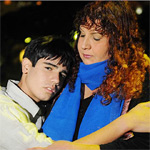Our first steps

Hello, my name is Amit Wolfman, and I am a single mother to a beautiful, talented autistic teenager. I was asked to write a personal column on my life with my son, like a diary of a mother to an autistic child. I’m one of those people who always have something to say, especially on issues close to my heart. I knew immediately What I wanted to write – about all those things related to a family coping with raising a child with special needs, but something with an optimistic point of view because I am Always trying to find the light at the end of the tunnel, however distant.
By the way, my son’s photo was taken by the photographer Avi Rocah.
Autism nowadays affects one in 250 births. There are more than 3,000 people with autism in Israel, and every year are added about 250 new cases occur. After receiving the diagnosis (and throughout their entire life), the families must recruit many forces and hidden strengths to deal with the difficulties of raising a child with special needs. My son’s Development in the first year was completely normal. He crawled on time, began walking on time, smiled and laughed at us, and his motor development was normal. Only in the field of nutrition were some difficulties. He refused to eat solid food. I attributed his refusal to the fear that I had from suffocation. At one year and nine months old, he still didn’t talk. Because my elder daughter started to talk when she was 2.2 years old, my gourds were down, and I didn’t suspect anything was wrong.
When my son was one year and ten months, I went to a baby clinic for a routine checkup to consult the doctor about the problems with feeding him; I was sure the problem lay with me. The doctor examined him for a minute and told me, completely insensitively: “Madam, it seems to me that your son is autistic.” I looked at her like she had lost her mind. I booked an appointment at the Institute for Child Development while trying to convince myself that they would calm my fears and tell me that the doctor was wrong and everything would work out for the best. At the Child Development Institute, my son was diagnosed with p.d.d n.o.s. I was in shock after hearing the diagnosis. I felt my whole world crumbling around me. I began feeling more and more guilty – maybe my son was born this way because I didn’t eat right during my pregnancy, or maybe I shook him too much in my stomach and caused him damage, or maybe something was wrong with my genes, and because of me, he was born like that. At the same time, I blamed the whole world: I was angry at God and angry at fate, I was angry with the doctors and the paramedical team.
As time went by, I started to resign from the situation. As my son started to show some progress with the help of the treatments he received, my sense of powerlessness was diminishing. However small, the need to fight for every achievement has increased my motivation. Throughout the years, I fought to put him into the best kindergarten and get him the best treatment available, and in the end, I fought for his admittance to the best school. Fortunately, I have always won these little wars against all odds. My wonderful son – already 17 years old today – precipitated my efforts through his progress and great love for me. His love gives me the strength to continue fighting to improve his life even more. Today I no longer ask “why it happened to me” but live with the feeling that the fact that it did strengthens me and makes me a better and stronger person. Coping with difficulties changed my point of view and helped me develop patience and tolerance. Parents of autistic children (especially mothers) are selected carefully. I was chosen because of my ability to love and give, which existed in me but was dormant. Pain and anxiety did not disappear, but I’m learning to live with them, and it strengthened me and force me to improve my coping with life.
Discover more from Living with Autism
Subscribe to get the latest posts sent to your email.



Thanks for an idea, you sparked at thought from a angle I hadn’t given thoguht to yet. Now lets see if I can do something with it.
Thank you.
Very nice information.